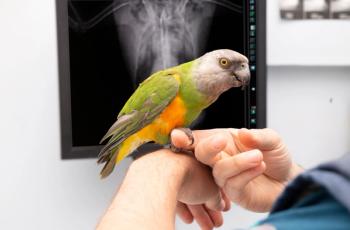
Illicit drug testing in dogs
Some pets are exposed to illegal or abused drugs by way of their owners, and these drugs can have detrimental effects on the pets. Owners may not be forthcoming about such exposures, so a simple rapid test to investigate exposure to these drugs would be helpful, especially in an emergency setting.
Untitled Document
Some pets are exposed to illegal or abused drugs by way of their owners, and these drugs can have detrimental effects on the pets. Owners may not be forthcoming about such exposures, so a simple rapid test to investigate exposure to these drugs would be helpful, especially in an emergency setting. On-site urine tests for drugs are readily performed in people, and one researcher looked into whether these same tests can be used in dogs. The test used in this study is inexpensive and available over the counter and can detect barbiturates, benzodiazepines, opiates, methadone, amphetamine/methamphetamine, cocaine, THC, and phencyclidine. Urine samples from dogs from four emergency clinics in urban areas as well as dogs from the University of California-Davis emergency service were evaluated. The researcher also sent the samples to the National Toxicology Laboratory to verify all results of the on-site urine test with gas chromatography/mass spectrometry (GC/MS).
In the urban practices, 25 dogs were suspected of being exposed to THC. The on-site test results were negative for all the dogs. The test results for four dogs potentially exposed to amphetamines were positive. Control samples were negative for THC and amphetamines. At the emergency service at UC-Davis, 20 dogs in the ICU that had received benzodiazepines, 11 that had received barbiturates, and 14 that had received opiates had positive test results for these drugs with the on-site test. However, the on-site test did not detect methadone in four dogs or synthetic THC (dronabinol) in four dogs; these drugs had been administered to the dogs. Control samples had negative results for benzodiazepines, barbiturates, opiates, and methadone. No tests were run for phencyclidine or cocaine because there were no suspected exposures.
All these results, including the negative results for the dogs that had received methadone and synthetic THC, were supported by GC/MS. Thus, the on-site test was accurate in detecting exposure to barbiturates, opiates, benzodiazepines, and amphetamines/methamphetamines, making it a useful tool in detecting drug exposure in dogs. Methadone and THC were not detected by either the on-site test or GC/MS, likely because these drugs are metabolized differently in dogs and not enough of the drugs was excreted in the urine to be measured. A different test must be evaluated to detect these two substances.
Teitler JB. Evaluation of a human on-site urine multidrug test for emergency use with dogs. J Am Anim Hosp Assoc 2009;45:59-66.
Link to abstract:
Newsletter
From exam room tips to practice management insights, get trusted veterinary news delivered straight to your inbox—subscribe to dvm360.




